Choosing the best SEO optimization tools in 2025 isn’t just about features. It’s about future-proofing your SEO strategy.
Search engines are evolving faster than ever, and with AI reshaping both content creation and algorithm behavior, marketers need smarter, more integrated tools to stay competitive. The tools you choose directly impact how efficiently you uncover ranking opportunities, optimize your site, and outperform your competitors.
Whether you’re focused on keyword strategy, content quality, or technical performance, the right toolkit can multiply your results while cutting wasted effort.
Today we’re sharing the top SEO tools, how to use them, and how to build a strong, effective SEO toolkit.
Let’s see the SEO tools list.
Best SEO Optimization Tools In 2025
The best SEO tools in 2025 go beyond basic analytics—they offer AI-powered insights, automation, and real-time recommendations.
Here is the list of bthe est SEO optimization tools.
1. Semrush
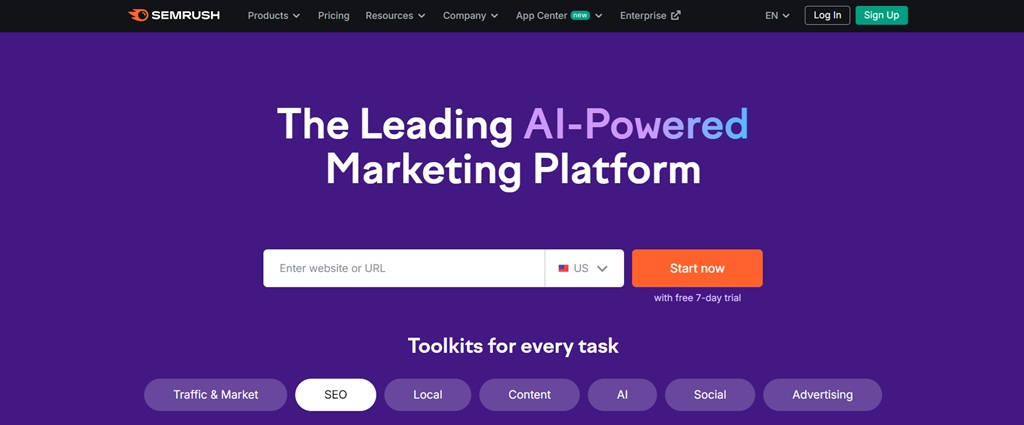
Semrush is like the Swiss Army knife of SEO. It does pretty much everything—track keywords, spy on competitors, audit your site, help you plan content—and it’s loaded with extra features like social media tracking and PPC tools too.
It’s especially great if you’re managing multiple sites or clients, since it gives you a big-picture view of everything that’s happening in your SEO world.
You can now get auto-generated content briefs, predictive traffic estimates, and way better SERP tracking without doing all the heavy lifting yourself.
It now includes LLM monitoring, so you can track how your brand appears inside AI-generated results like ChatGPT, Google’s AI Overviews, Perplexity, and Gemini.
Pros:
- Super detailed data and reports
- Awesome for competitor research
- AI tools save a ton of time
- Unique LLM monitoring lets you benchmark AI visibility
Cons:
- Not cheap, especially for smaller teams
- Can feel overwhelming
- Steep learning curve for newbies
2. Ahrefs
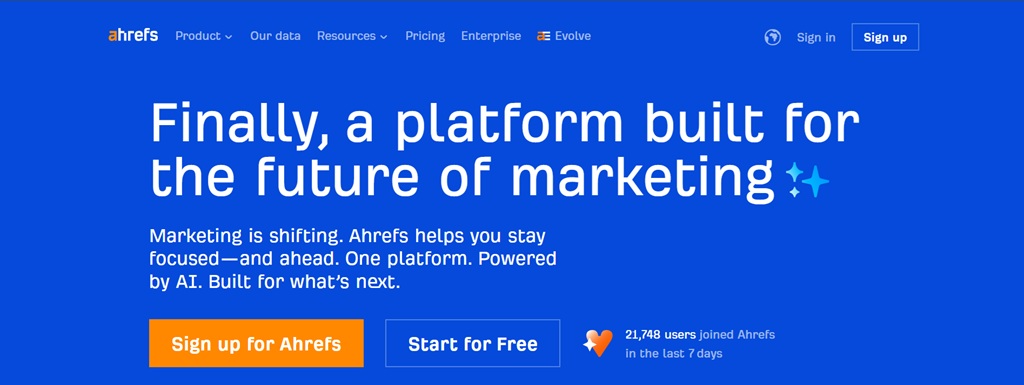
Ahrefs is the go-to tool if you’re obsessed with backlinks and digging into what your competitors are doing. It’s clean, fast, and laser-focused on giving you the info you need to outrank the competition.
Their backlink database is massive, and the keyword and content tools are super powerful too.
In 2025, Ahrefs rolled out something genuinely fresh: Brand Radar. This lets you track how often your brand shows up across AI platforms like ChatGPT, Perplexity, Google’s AI Overviews, Gemini, and Microsoft Copilot.
Pros:
- Best backlink analysis out there
- Great for spotting content gaps
- Simple interface, very fast
Cons:
- No built-in content briefs or AI tools
- Limited users unless you’re on a high-tier plan
- Brand Radar is powerful, but it’s an add‑on and can get pricey
3. Moz Pro
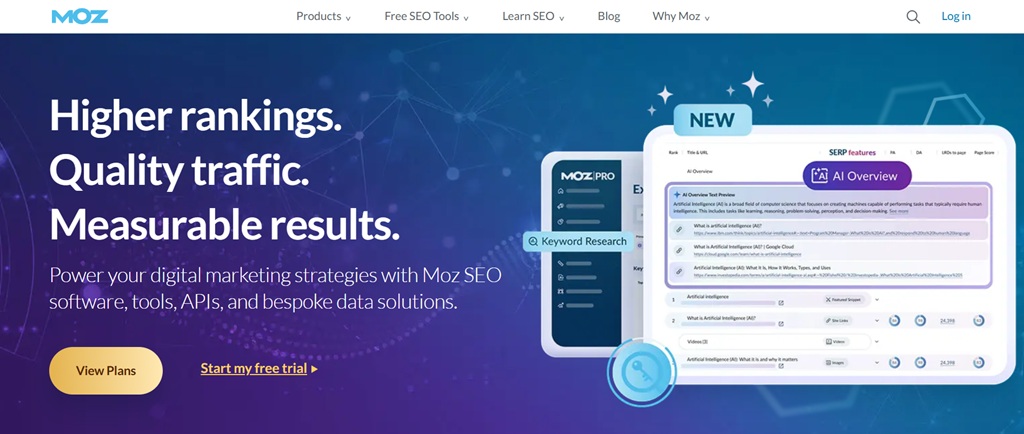
Moz Pro is like the friendly neighborhood SEO tool. It’s easy to use, not too expensive, and super helpful if you’re just getting started or don’t need anything too intense.
It’s not the most advanced platform, but it holds its own with tools like the Page Optimization grader, Keyword Explorer, and good ol’ Domain Authority tracking.
Moz Pro is one of the best SEO tools for beginners, thanks to its clean interface, simple recommendations, and learning-friendly features.
Pros:
- Beginner-friendly and super intuitive
- Solid keyword and page-level optimization tools
- Helpful training and resources included
Cons:
- Data isn’t as deep or fast as SEMrush or Ahrefs
- Fewer features for advanced users
4. Screaming Frog
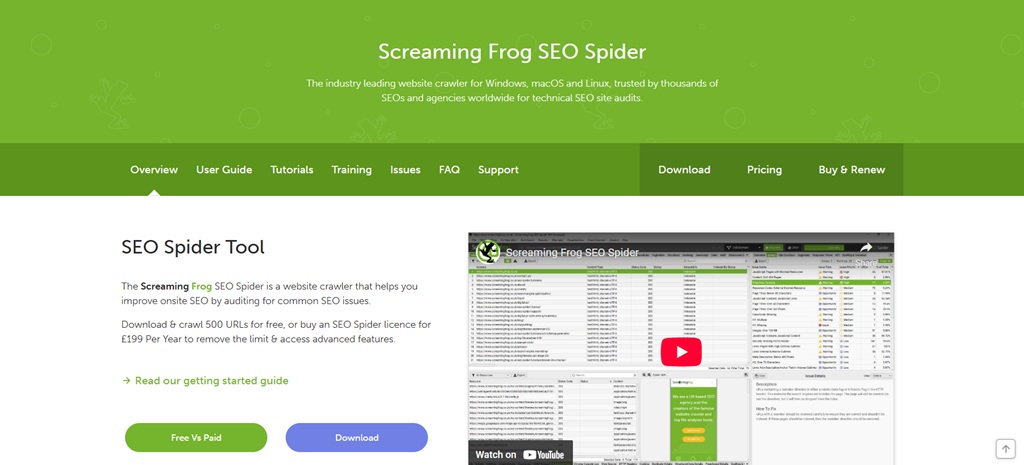
This tool has been around forever, and for good reason. Screaming Frog is a lightning-fast desktop crawler that scans your whole site and spits out a detailed list of issues. Think broken links, duplicate content, missing metadata, bloated pages… basically anything that could mess with your rankings.
Pros:
- Super thorough and fast, even for big sites
- Let you export raw data for custom analysis
- No-frills, power-user favorite
Cons:
- The interface is kinda old-school
- Not great for visual learners or beginners
- Desktop only—no cloud-based access
5. Google Search Console
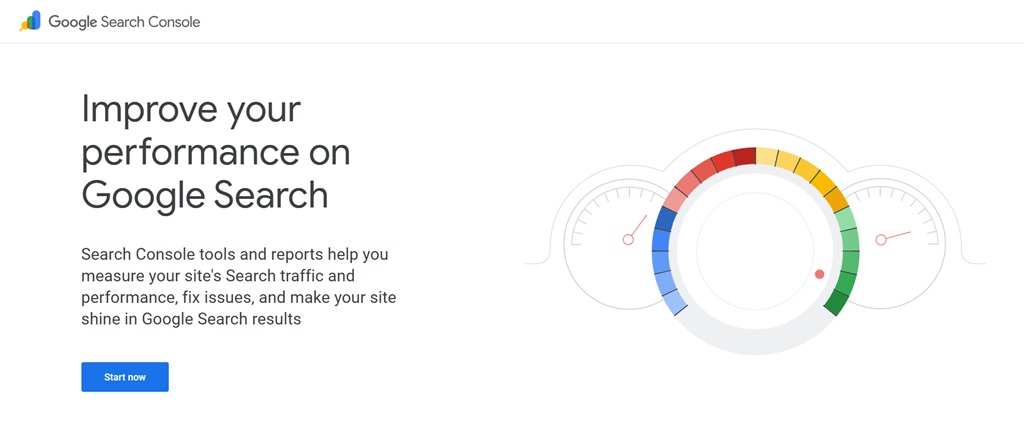
This one’s free, and it’s straight from Google—so yeah, it’s kind of essential. Search Console shows you which pages are getting indexed, which ones have issues, and how your site is performing on Core Web Vitals. It’s not as detailed as some of the paid tools, but it’s your first line of defense when something goes wrong.
Pros:
- Great for tracking indexing, mobile usability, and performance
- Totally FREE
- Direct insight from Google itself
- Alerts you to manual actions or penalties affecting your site
- Shows which keywords bring users to your pages
Cons:
- UI isn’t the most intuitive
- Doesn’t catch everything a full site audit would
6. Yoast SEO
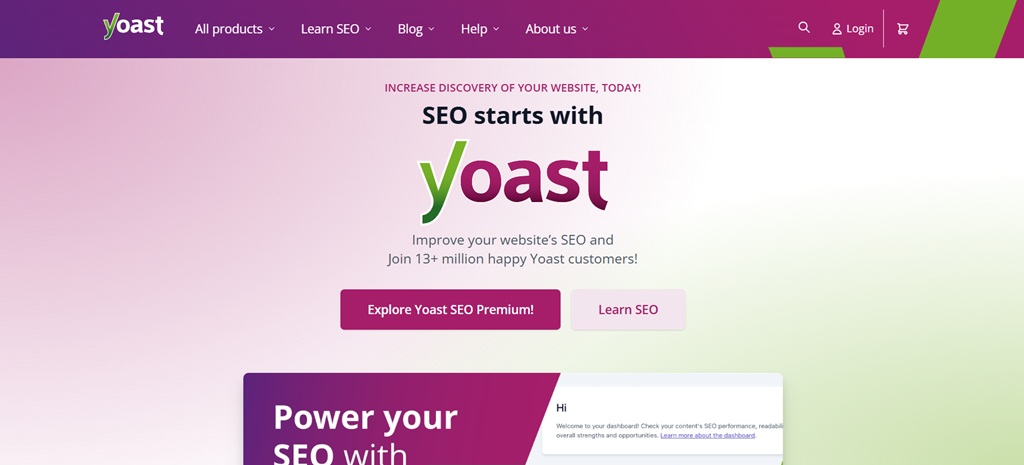
If you’re using WordPress, Yoast SEO is kind of the go-to plugin for handling on-page and technical SEO. It gives you real-time feedback while you write. It helps you optimize things like keywords, meta tags, readability, and internal links without needing to be an SEO expert.
It also handles a bunch of technical stuff automatically: generating XML sitemaps, adding schema markup, managing redirects, and setting canonical URLs. That’s what makes it one of the best SEO optimization tools for beginners using WordPress.
Now, Yoast added support for llms.txt, which helps AI tools like ChatGPT better index and represent your content.
The free version covers the basics, but the Premium version unlocks more powerful tools like smart internal linking, redirect automation, and AI-generated meta suggestions.
Pros:
- Beginner-friendly and built right into WordPress
- Real-time SEO feedback while you write
- Handles technical SEO automatically
- Now includes llms.txt for AI search visibility
Cons:
- Free version is limited to one keyword per page
- Not as powerful or customizable as more advanced tools
- Premium features require a paid upgrade
7. BuzzSumo

BuzzSumo isn’t a traditional backlink checker—it’s more of a content + influencer discovery tool. But it’s super helpful for building links.
You can find what kind of content is getting shared and linked to, see who’s linking to it, and use that data to pitch your own stuff or build relationships.
Pros:
- Great for finding linkable content ideas
- Helps identify influencers and journalists in your niche
- Solid for digital PR and content promotion
Cons:
- Limited backlink metrics compared to Ahrefs or Majestic
- More of a discovery tool than a full backlink audit platform
8. Detailed SEO Extension
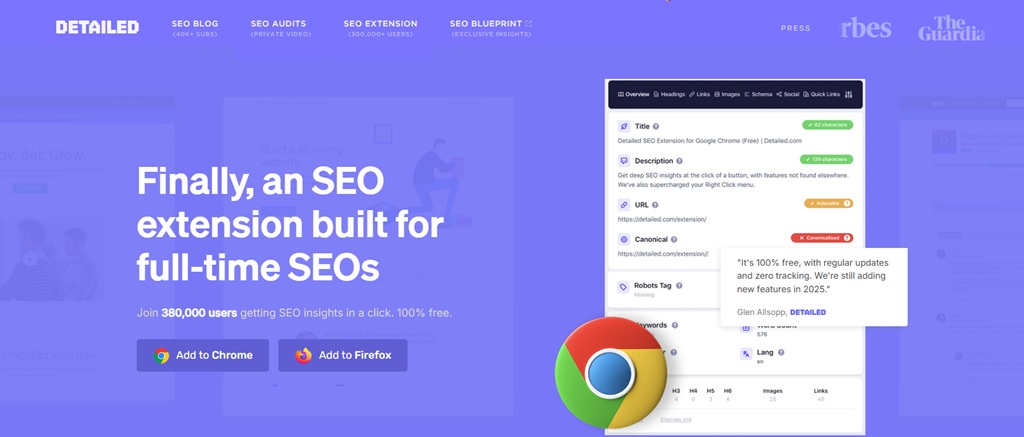
The Detailed SEO Extension is one of the fastest, simplest ways to get instant on-page SEO data without digging through code or opening a separate tool.
Just click the Chrome extension icon and boom—you get everything from meta tags and heading structure to schema, word count, and internal/external links.
It’s built specifically for SEOs, with no tracking, no upsells, and no fluff.
You can even switch to Googlebot view, export links, or quickly open tools like Ahrefs or PageSpeed Insights from any page.
Best part? It’s 100% free and works straight out of the box.
Pros:
- Lightning-fast page-level insights with no login or setup needed
- Shows metadata, heading structure, schema, robots tags, link analysis
- Bonus tools like Googlebot mode, external tool shortcuts, export options
- Always free—no premium tiers, no tracking
Cons:
- Only works on one page at a time (no full-site crawling)
- No historical trend data or ranking reports (just current view)
9. ChatGPT for SEO

If you’re looking for a versatile tool that can jump into your SEO workflow, ChatGPT is surprisingly powerful. It’s not a dashboard or a crawler. But it’s like having an assistant that helps you brainstorm, draft content, and troubleshoot problems fast.
ChatGPT is super handy for brainstorming long-tail keywords, creating topic clusters, and drafting meta titles or outlines.
There’s a growing tactic called LLM seeding—structuring content (like FAQs and tables) so AI tools like ChatGPT are more likely to cite it in search results.
Pros:
- Super fast content ideation and writing help
- Excellent for meta tags, outlines, and content brief generation
- Useful for troubleshooting SEO issues or improving drafts
- Supports LLM-friendly formats to boost visibility in AI search
Cons:
- Doesn’t replace real keyword tools or official ranking tools
- Outputs vary—it needs very clear, detailed prompts
- Often needs heavy editing to inject uniqueness, expertise, and accuracy
10. Pitchbox
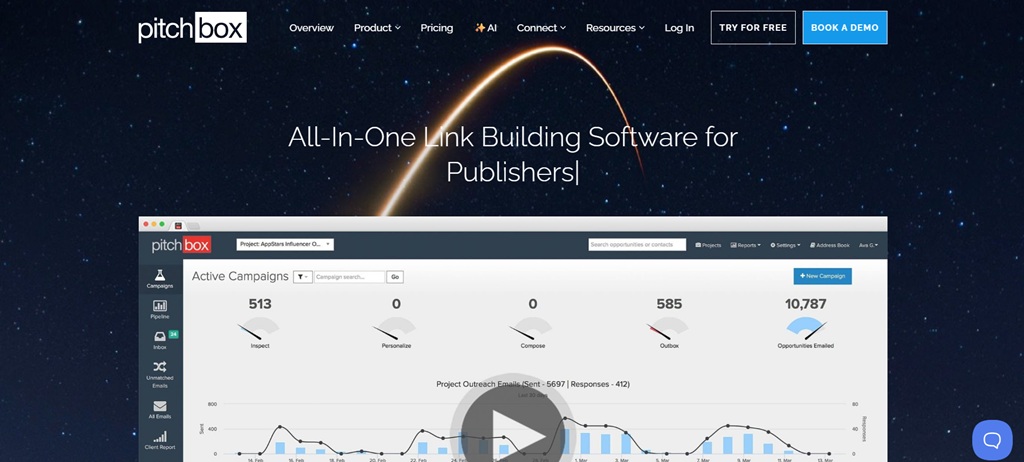
Think of Pitchbox as your outreach command center. It’s an all-in-one platform designed to take the heavy lifting out of link building—handling prospecting, email outreach, follow-ups, CRM-style tracking, and performance reporting, all in one dashboard.
Whether you’re chasing guest post links, digital PR opportunities, or recovering broken backlinks, it’s built to scale.
With AI-powered templates, smart scheduling, and integrations with tools like Ahrefs and SEMrush, it makes scaling your link-building campaigns way easier.
Pros:
- Automates outreach, follow-ups, and prospecting
- Integrates with major SEO and email tools
- Offers strong analytics and reporting features
Cons:
- Expensive, especially for small teams
- Learning curve can be steep
Supercharge Your SEO Strategy with the Right Tools
With so many SEO tools out there, it’s easy to get overwhelmed by dashboards, data, and endless features. But tools don’t drive growth—strategy does.
The key isn’t just having access to the best tools; it’s knowing exactly how and when to use them.
At Flying V Group, we help businesses cut through the clutter. We focus on the tactics and tools that move the needle—whether that’s ranking higher, earning more links, or converting more visitors.
Let’s discuss your SEO strategy.
Frequently Asked Questions
1. Is there a free SEO tool that’s actually useful?
Yes! Google Search Console, Yoast SEO (free version), and the Detailed SEO Extension are great free tools. They offer real value for keyword optimization, indexing checks, and on-page SEO without needing to pay a dime.
2. Can ChatGPT help with SEO?
Absolutely. ChatGPT is a powerful assistant for generating keyword ideas, content outlines, meta tags, and even technical troubleshooting suggestions. It works best when paired with solid data from other SEO tools.
3. How do I choose the best SEO optimization tools for my business?
To choose the best SEO optimization tools, define your goals, like keyword research, technical audits, or content optimization. Then compare features, ease of use, support, and pricing. Select tools that match your business size, SEO strategy, and technical comfort level for maximum effectiveness.
4. Which SEO tool is best for technical audits?
Screaming Frog is the best for auditing a website. It can help uncover crawl issues, broken links, slow pages, and indexation problems that can hurt your rankings.





0 Comments